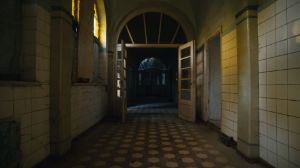Film & Lecture | Pallavi Paul: How Love Moves
Sick Buildings
On the History of the Heilanstalten Hohenlychen with Andreas Jüttemann and Judith Hahn

Pallavi Paul, Twilight’s Envelope / Und in der Dämmerung Hülle, film still, 2024 © Pallavi Paul
As part of the public programme Six Days of Love accompanying Pallavi Paul’s current exhibition How Love Moves, this evening reflects on relationships between architecture and medicine in the context of healthcare crises. After a screening of Pallavi Paul’s short film Twilight’s Envelope / Und in der Dämmerung Hülle (2024), the historians Judith Hahn and Andreas Jüttemann will share short impulses on their research into the history of the Heilanstalten Hohenlychen, a former tuberculosis facility close to Berlin.
Opened in 1902 in Lychen (Northern Brandenburg), the sanatorium was not only a place for healing procedures. It was also connected to violent medical experiments that were performed at the concentration camp Ravensbrück closeby, in which some of the clinic’s doctors and medical staff were involved. While Pallavi Paul’s cinematic work attends to the architectural ruin haunted by psychological, bodily and spiritual remnants through a fusion of narrative and temporal strands, the two speakers will shed light on the relationship between care and healing in the context of the site’s complex history.
Dr phil. Judith Hahn, historian and exhibition curator, has been a research associate at the Charité’s Museum of Medical History in Berlin since 2021. Her research focuses on the history of National Socialism. She completed her doctorate in 2007 on doctors in the SS medical service, including the sports physician Karl Gebhardt in Hohenlychen, and has researched and curated projects at the Institute for the History of Medicine at Charité such as Cultures of Madness and Gedenkort.Charité.
Prof Dr Andreas Jüttemann works as a research assistant at the Institute of Anatomy at Medizinischen Hochschule Brandenburg and as a deputy professor in the field of human-technology interaction at Magdeburg-Stendal University of Applied Sciences in the history of medicine. He studied psychology (FU Berlin and Bremen) and urban studies (Bauhaus University Weimar), completed his doctorate in 2015 on Prussian lung sanatoriums (with a focus on Brandenburg) at Charité Berlin and habilitated in 2021 in the history of science and technology at TU Berlin. His research focuses on Berlin-Brandenburg regional and medical history. He has also organised city tours, curated exhibitions and written books on Berlin-Brandenburg history with a focus on lost places.